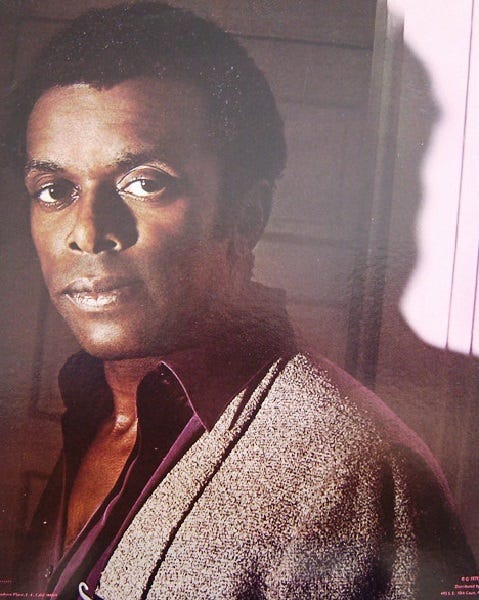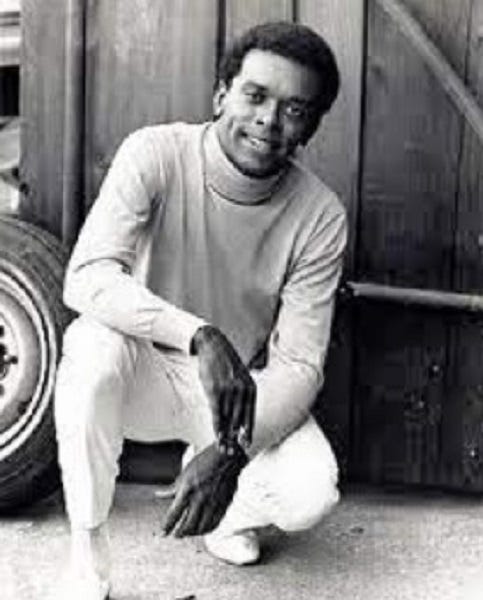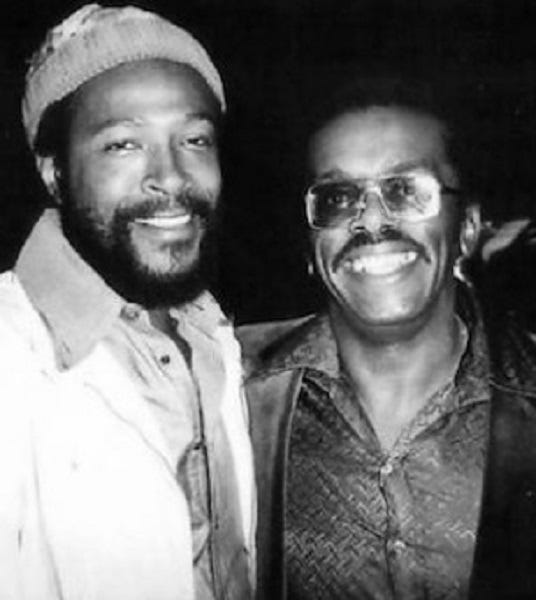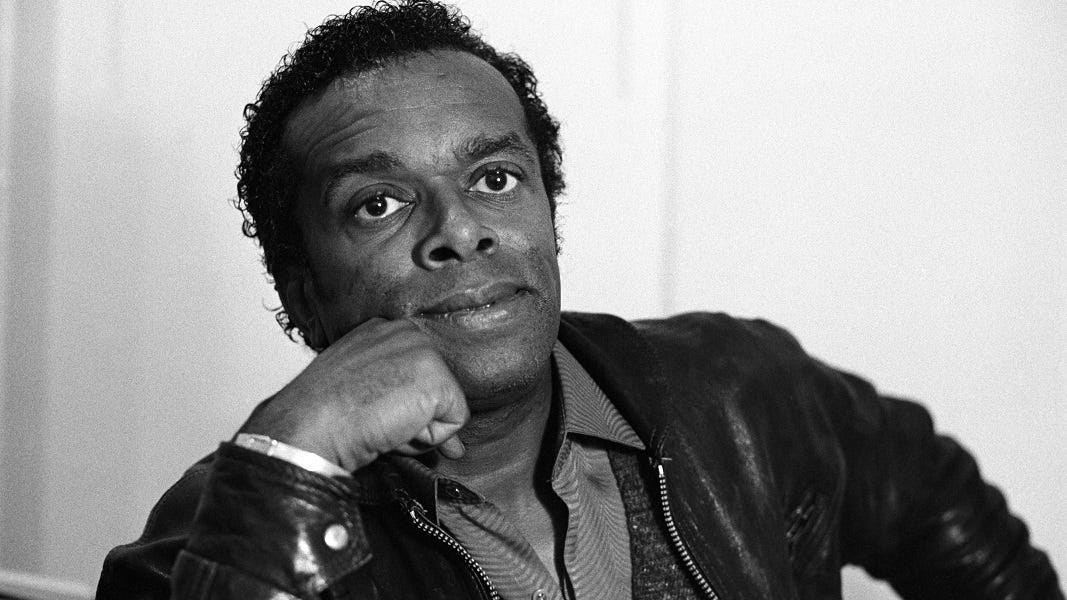Leon Ware (February 16, 1940 – February 23, 2017) – Let It Out, Let It In (1970)
The genius behind Marvin Gaye's I Want You LP wrote and produced this phenomenal, overlooked universal love anthem for the only album ever released by the group Truth.
View most updated version of this post on Substack
Open YouTube playlist of all songs
Search our full archives
Leon Ware was a gifted singer/songwriter, keyboardist and producer who wrote hits for many artists at Motown and beyond and released a dozen of his own solo albums. He is best known for co-writing and co-producing every track on Marvin Gaye’s classic 1976 album I Want You.
Born and raised in Detroit, Ware was the youngest of ten children. Their father worked on the assembly line at a Ford plant, and their mother was the minister and pianist at a Baptist church. In high school, he joined a vocal group called the Romeos alongside Lamont Dozier and future Originals member Ty Hunter.
He began working as a songwriter for Motown in the mid-sixties. His first song to be recorded there was the beautiful “Tell Me I'll Never Be Alone,” which he co-wrote with established songwriters John Dean and William Weatherspoon for Martha and the Vandellas’ 1966 album Watchout!
Ware also co-wrote the upbeat jam “Got To Have You Back” with Ivy Jo Hunter and Stephen Bowden for the Isley Brothers, who were signed to Motown at the time. It was produced by Hunter, recorded in 1966, and released as a single in March, 1967.
He next wrote songs with Funk Brother saxophonist Mike Terry, who had grown tired of his lack of opportunities to write, arrange and produce at Motown and was secretly stepping out. They co-wrote a series of tracks for LeBaron Taylor and Don Davis’ labels Solid Hit and Revilot Records, starting with the urgent heartbreak song “Warning” (1966) for Pat Lewis on Solid Hit, who two years later would later become one of the Andantes, Motown's female backing vocalists. She subsequently spent the seventies as part of Isaac Hayes' backing vocal group Hot, Buttered, And Soul.
They also co-wrote the upbeat jams “Loves Creeping Up On Me” by the Holidays and Rose Battiste’s “Come Back In A Hurry” both on Revilot, and the superb “I’m In Love Again” by the Debonaires on Solid Hit. All were produced by Ware, arranged by Terry, and released in 1967.
When Motown A&R head William “Mickey” Stevenson (and his wife, singer Kim Weston) left the label that same year for MGM Records, he enlisted Ware to co-write nearly half the songs for his first production there. Souled Out (1967) was the Righteous Brothers’ third album on MGM subsidiary Verve. Ware co-wrote most of his contributions to the LP with songwriter Vicki Basemore, including “I Don’t Believe In Losing.” It was covered by The Major IV the following year and released as a single on Venture, MGM’s R&B label that Stevenson was appointed to head in 1969.
Ware’s new association with MGM expanded his songwriting reach. He and Terry co-wrote the heartfelt love song “When I'm In Your Arms” for Terri Bryant, released on Verve in April, 1967. Original copies today sell for $100 on average on Discogs. He and Basemore co-wrote two songs for the psychedelic rock/soul group Southwind’s 1968 self-titled debut LP on Venture, one of which was the stellar “I’m Proud To Be,” produced by Ware. The album also featured several songs written and produced by a young Willie Hutch.
In 1970, Ware wrote and produced the superb, socially conscious, overlooked song “Let It Out, Let It In” for Truth’s self-titled debut LP on People Records (a short lived label founded in 1969 by Stevenson after Venture shut down, which lasted for two years before merging with Canyon Records in 1971, not to be confused with James Brown’s label of the same name). Ware and Stevenson separately produced most of the album, the only one the group ever released. “Let It Out, Let It In” was later covered by Love ‘N Stuff, the B-side of their only single “Right On, Brothers, Right On” which Stevenson produced for Pride Records in 1971.
“Let your love come out, let love come in / Free your heart, reach out to all the world / Communicate and unite a divided world / This is your time, this is my time to share, to care / Let it out, let it in / let the song of love begin.”
For Merry Clayton’s self-titled second LP on Ode Records, produced by Lou Adler and released in 1971, Ware wrote the stellar closing cut “Whatever.”
He co-wrote “Come L’Amore” with lyricist Bob Hilliard for Bobby Womack’s Communication LP, released in September, 1971 on United Artists. Around this same time, Ware was collaborating with Ike and Tina Turner on their ‘Nuff Said album for the same label. He co-wrote six of its ten tracks, including the upbeat jam “What You Don't See (Is Better Yet).” No singles were issued from the LP, but it still landed at #21 on the R&B album charts in late 1971, and many critics called it their best record yet.
United Artists gave Ware a contract as a solo artist, and he released his self-titled debut album in 1972. Its masterpiece track was arguably “What’s Your World,” which Womack would memorably cover three years later for his I Don't Know What the World Is Coming To LP.
Ware began writing songs with Diana Ross’ younger brother Arthur “T-Boy” Ross, and together they composed “I Wanna Be Where You Are” for Michael Jackson’s first Motown solo album Got to Be There, released in January, 1972. The track was issued as the LP’s third single that May, and went to #2 R&B and #16 on the Billboard Hot 100.
In 1974, Quincy Jones brought Ware on board for his latest album Body Heat.
Ware co-wrote three of the LP’s songs including its superb title track on which he and singer Bruce Fisher were both featured on vocals, the funky jam “One Track Mind” which he co-wrote with Q, and the stellar closing cut “If I Ever Lose This Heaven,” co-written with Motown songwriter Pam Sawyer. He laid down vocals for it in a duet with Minnie Riperton.
The following year, Ware worked with Riperton on her third studio album Adventures in Paradise, which was released in May, 1975. He co-wrote three songs with Riperton and her husband Richard Rudolph, one of which was the sensual jam “Inside My Love.”
Ware and Riperton both insisted the song’s seemingly explicit lyrics referred to true intimacy, not just sex, but many radio stations refused to play it. As a result, it only went top-30 R&B, a far cry from her #1 Hot 100 smash “Lovin' You” which had topped the charts only a month before Adventures in Paradise came out. Yet the LP itself hit #5 on the R&B charts and #18 on the Billboard 200.
In 1975, Ware and Arthur Ross were polishing demos for Ware’s planned second album on Motown. But when Berry Gordy heard them, he decided they would be a perfect fit for Marvin Gaye. Ware collaborated with Gaye on his next album I Want You, co-writing and co-producing all of its tracks. Released in March, 1976, the sexy title track shot to #1 R&B and #15 on the Hot 100. The album topped the R&B album charts and peaked at #4 on the Billboard 200 on its way to going platinum.
Its critical reception at the time was mixed, and was dismissed by several prominent white critics. One was Dennis Hunt of the Los Angeles Times (whose later description of EWF as a “nostalgia act” in the mid-nineties drew an epic response from Verdine White), who called the LP “disappointing” and “only partially commendable.” For the most part, its detractors couldn’t grasp the concept of a classy seduction record that could also double as a blue light basement party soundtrack.
I Want You has since been belatedly recognized as one of the greatest albums of all time. It is possibly responsible for the birth of more babies than any other single LP, a sensual, seamless listening experience from its classic opening title track to its flawless slow jam closing cut, the vocal version of “After The Dance.”
In the early eighties, Ware produced (and co-wrote nearly all the songs on) two albums for the trio Shadow, made up of former Ohio Players members (guitarist Clarence “Chet” Willis, drummer James “Diamond” Williams, and keyboardist William “Billy” Beck). The first, their self-titled 1980 LP, featured the phenomenal cut “Mystery Dancer,” co-written and arranged by all four of them.
Happy Heavenly Birthday to the great Leon Ware.
Further info:
“Leon Ware: Come With Me, Angels,” conversation hosted by Torsten Schmidt, Red Bull Music Academy, Seattle, 2005.
“Leon Ware – Love's Endless Servant,” interview by Michael J. Edwards, Parts One and Two, UK Vibe, 2014.
“Key Tracks: Marvin Gaye’s I Want You,” interview with Leon Ware and Janis Gaye, by Chris Williams, Red Bull Music Academy Daily, April 1, 2016.
“Leon Ware, Producer Who Worked With Marvin Gaye, Dies at 77,” obituary, The New York Times, March 2, 2017.
#soul #funk #disco #Motown #MarvinGaye #LeonWare











Right on! Nice article, Jointz! I have Ware's super sexy "Musical Massage" LP. Its cover immediately catches one's attention, but the grooves within are equally funky, soulful, and sensual mid-'70s R&B.